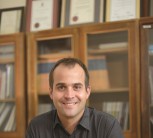A two-minute smartphone test can identify hearing and vision problems before children even start school according to new research published in the prestigious Bulletin of the World Health Organisation.

Professor De Wet Swanepoel, PhD, is a professor of audiology in the Department of Speech-Language Pathology and Audiology in the Faculty of Humanities at the University of Pretoria (UP). He is a leading international researcher in teleaudiology, hearing health innovation and new service delivery models.
Prof Swanepoel is Research Director of the World Health Organisation’s (WHO) Collaborating Centre for Prevention of Deafness and Hearing Loss at UP. He is also a senior research fellow at the Ear Science Institute Australia, and has served as a visiting professor at universities in the US, Sweden and Australia.
His research capitalises on digital health to explore, develop and evaluate innovative technologies and service delivery models for ear and hearing care. He has published more than 220 peer-reviewed articles, books and book chapters, and is funded by the US National Institutes of Health, the Academy of Medical Sciences in the UK, the National Research Foundation, SA, and other industry partners. He has received numerous international awards for his work, from international science councils, audiology associations and industry.
Prof Swanepoel is a sought-after keynote speaker at international events for global organisations such as the WHO, and for American and British academies of audiology. He regularly features on national and international TV and radio channels, including CNN, Sky News, CNBC and the BBC. Prof Swanepoel is also Editor-in-Chief of the International Journal of Audiology and a former president of the International Society of Audiology. He holds several patents and is founder of hearX group, a digital health company.
 Story
Story
University of Pretoria (UP) researchers have found that the antioxidant content of certain types of tea can be likened to that found in recommended portions of fruit and vegetables.
 Infographic
Infographic
Half a cup of black tea, oolong tea or green tea contained the same amount of antioxidants with radical scavenging capabilities (RSC) as that of a 200mg vitamin C tablet.
 Story
Story
Researchers at the University of Pretoria (UP) may have identified the gene that is responsible for diet-related obesity. By exploring the role of the novel gene Slc7a8, they have made a potential breakthrough in current knowledge about the cellular mechanisms that drive fat accumulation. This understanding is crucial in developing effective treatments.
Copyright © University of Pretoria 2025. All rights reserved.
Get Social With Us
Download the UP Mobile App